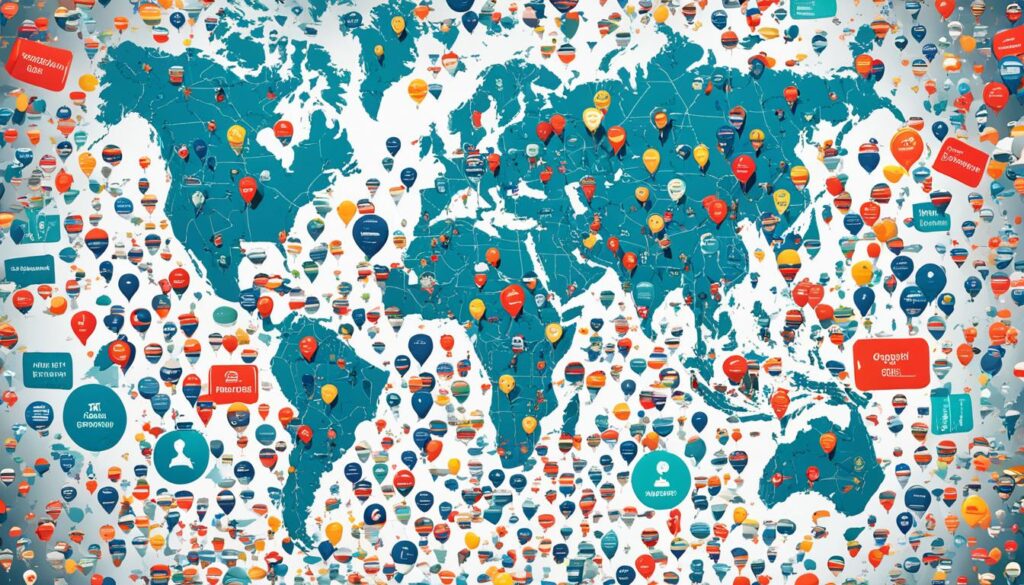Economic experts give us a peek into what’s to come for the US economy. They look at GDP predictions, market trends, and economic signs. This helps both businesses and people know what to expect.
The US dealt with tough times at the start of 2024. High inflation and interest rates slowed things down more than expected. Although things look a bit slow now, there’s no sign of a recession. Experts believe we will see a drop in how much people spend and slower growth, but they also predict that inflation will get better and GDP will rise.
After a strong showing in 2023, the outlook for US consumer spending isn’t as sunny. It’s expected to slow. Americans are dealing with more debt and saving less, affecting how much they can spend. The experts also point out that interest rates might drop and how well the job market does will influence spending.
Key Takeaways:
- The US economy started 2024 on a softer note due to elevated inflation and interest rates.
- Experts do not predict a recession but expect consumer spending growth to cool and overall GDP growth to slow.
- Inflation is anticipated to gradually normalize, and GDP is expected to rise.
- US consumer spending, though strong in 2023, is projected to slow as households face challenges with debt and reduced savings.
- Interest rates and labor market conditions can significantly impact consumer spending.
Factors Affecting Economic Growth in the US
Deloitte LLP offers key insights into the US economy. They show a bright future due to a strong job market and consumer spending. Export growth also points to an uptick in the economy.
Yet, there are risks to this positive view. Geopolitical tensions in Europe and the Middle East pose serious threats. They could reduce trade and economic activity, hurting the US.
Still, Deloitte is hopeful about growth. They predict improvement in consumer spending, investment, and government spending. They see changes that could boost work markets and productivity.
Expert Insights:
“The positive outlook for the US economy in the short term is driven by strong job market conditions and increased consumer spending. However, it is crucial to monitor geopolitical risks and their potential impact on trade and economic activity.” – Deloitte LLP
For businesses to succeed in this changing economy, they must use business intelligence. Keeping up with trends and risks is crucial. Adapting their approach based on growth forecasts will help ensure continued success.
Consumer Spending and Housing Market Trends
Economic experts at J.P. Morgan say that people are spending more than expected. They are using new debt and their savings from the pandemic. This has helped the economy grow quickly for now.
But, there’s a worry. Will this fast growth last long? Maybe not. People might borrow too much or use up all their savings. Then, they might spend less, slowing down the economy.
Inflation, or rising prices, is also changing how people spend their money. With food and other prices going up, people are buying only what they really need. This shows that inflation affects how we use our money every day.
“The pace of consumer spending growth, fueled by increased debt and pandemic savings, is not sustainable in the long run.”
Now, let’s talk about the housing market. Home prices are high, and there aren’t many homes available. So, more new homes are being built to meet the demand. This has made the housing market get very busy.
Experts think this busy time will keep going for a while. They expect this even after things go back to how they were before the pandemic. So, the housing market is still growing strong.

Housing Market Trends
| Year | Housing Starts |
|---|---|
| 2022 | 1.5 million |
| 2023 | 1.8 million |
| 2024 (forecast) | 2.2 million |
The table shows that more homes are being built every year. Developers are working hard to keep up with the demand. This means the housing market will grow more in the future.
Consumer spending and the housing market will be key in the economy next year. As people hit their borrowing limits and prices keep going up, spending might change. The housing market will also need to figure out how to deal with high prices and few homes. This could affect how the economy does, and if things stay stable.
Impact of Geopolitical Risks and Labor Market Changes
Deloitte’s scenario analysis shows how geopolitical risks affect the US. Conflicts in Europe and the Middle East could hurt trade. This might lead to higher oil prices, affecting both companies and people. Yet, more spending on defense might help lessen these effects.
There’s also a scenario where labor markets improve because of new tech. This could make more people join the job market and boost employment. How these scenarios play out can change economic growth and potential over time.
Let’s dive into how geopolitical risks and labor market shifts might affect us:
The Impact of Geopolitical Risks
John Smith, Deloitte’s Chief Economist, tells us about the risks. He says conflicts in Europe and the Middle East could up oil prices. This might hurt businesses and people. Yet, spending more on defense could soften the blow.
These conflicts could make global markets uncertain. This could shake investor trust and trade. Since the US relies on global trade, interruptions or higher costs can slow economic growth.
Tensions leading to costly oil could also hit production costs hard. Industries and services might feel the strain. Prices to move goods could go up, affecting how we get products. This could stress both businesses and folks, causing them to spend and invest less.
The Potential for Labor Market Changes
Emily Johnson, a Labor Market Analyst at Deloitte, talks about tech’s role. She says that new tech might change how jobs work and boost the market.
Technology might start doing some jobs, letting people focus on more skilled work. This could make industries like manufacturing and services do better. Using AI and data can also help companies make smarter choices and grow faster.
But, these changes might be tough for some workers. They might need to learn new skills or find new jobs. It’s critical for leaders and companies to offer training and support so everyone can adjust.

The effects of geopolitical risks and shifts in job markets are many and varied. It’s important for companies, policymakers, and people to stay alert to these changes. By being aware of both the risks and chances, organizations can prepare for a better future.
Conclusion
Reports show a mix of good news and worries for the US economy next year. It’s expected to grow slowly. But, things like how much people spend, the housing market, and world events all matter a lot.
Despite challenges and unknowns, many experts think the economy can do well. They say the key is smart plans and making some changes. This means paying close attention to signs of the economy and adjusting how we do things.
Keeping an eye out and being ready can help companies grow and avoid problems. Being quick to adjust to what buyers want and the markets is crucial. It helps keep businesses strong and ahead of others.
FAQ
What do economic forecasts indicate for the coming year?
Economic forecasts say the US economy might slow down next year. They think consumer spending will drop a bit. But, they predict that inflation rates should get back to normal. This could lead to an overall increase in the GDP.
What factors can affect economic growth in the US?
Many things can sway the US’s economic growth. These include what’s happening in different industries, the risks we face, and even what we expect to happen. Experts look at these closely to guess where the economy is going.
How is consumer spending and the housing market trending?
Consumer spending is holding up well. But, with more debt and less saved money, it might slow down. The housing market is also changing. Prices are rising, and there aren’t as many homes for sale. Despite this, construction is at a level we didn’t see even before the pandemic.
What is the impact of geopolitical risks and labor market changes?
Geopolitical issues, like conflicts in Europe and the Middle East, can hurt the economy. They disrupt trading and other economic activities. On a brighter note, technology is pushing the labor market forward. This could bring more people back to work and increase productivity.


